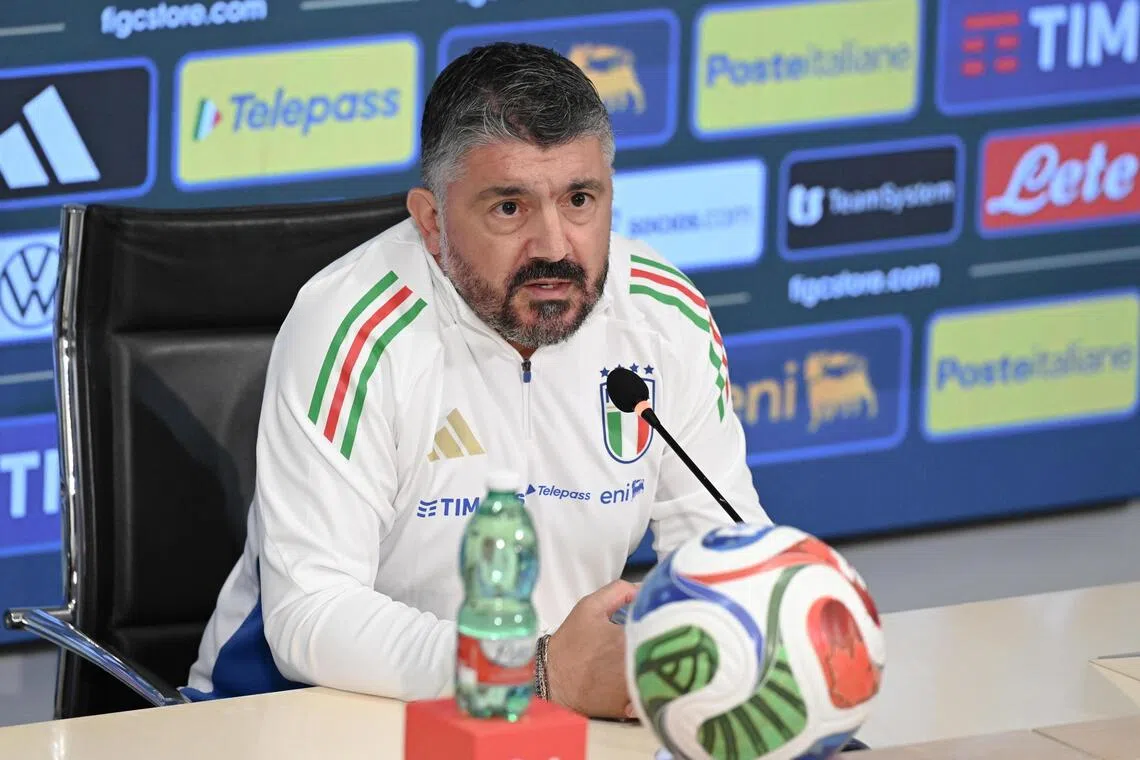In the Spotlight
Gennaro Gattuso aims to steer the Azzurri past a third World Cup failure
In this series, The Straits Times highlights the players or teams to watch in the world of sport. Today, we focus on Italy’s national football team and their struggles in their bid to reach the 2026 World Cup.
Sign up now: Get the biggest sports news in your inbox

The appointment of new Italy coach Gennaro Gattuso sparks hope but also doubts about whether he can reverse the slide.
PHOTO: EPA
Follow topic:
Italy, once titans of global football with four World Cup titles, stand at a crossroads. As the 2026 World Cup qualifiers near their November conclusion, the Azzurri are mired in a troubling campaign, teetering on the edge of a third consecutive World Cup absence.
Failing to qualify for the Finals in 2018 and 2022 – following devastating play-off losses to Sweden and North Macedonia – has left deep scars.
Now, with four matches played and four remaining in qualifying Group I, Italy’s path to the expanded 48-team tournament in the United States, Canada and Mexico looks perilous. A third miss would not just be a shock; it would signal a crisis for a nation synonymous with footballing excellence.
At the heart of this struggle is new coach Gennaro Gattuso, whose appointment sparks hope but also doubts about whether he can reverse the slide.
Italy’s qualifying campaign has been a turbulent ride.
Drawn into a challenging group alongside Norway, Israel, Estonia and Moldova, the Azzurri started under Luciano Spalletti, whose tenure ended abruptly after a poor showing.
A 3-0 loss to Norway
On June 15, the FIGC turned to Gattuso, a 2006 World Cup hero known for his tenacity at AC Milan and Napoli. “The blue jersey is like a second skin for him,” FIGC president Gabriele Gravina said, praising Gattuso’s “motivations, professionalism and experience”.
Gattuso’s arrival brought cautious optimism from the man himself.
At his June 19 unveiling in Rome, he acknowledged the weight of the task, saying: “It’s a dream come true, and I certainly hope to be up to the task. I know the job won’t be easy, but nothing in life is easy.”
He also pinpointed the psychological burden of recent failures, noting that players are feeling the pressure of missing two World Cups, and that has been weighing on their performances.
His first matches showed promise but underscored persistent issues.
A 2-0 home win over Moldova on June 9 offered relief, but it was under Spalletti’s watch. Gattuso’s debut, a 5-0 thrashing of Estonia in Bergamo on Sept 5, hinted at offensive revival.
Yet, three days later, a chaotic 5-4 win against Israel
The Azzurri’s next match is away at Estonia on Oct 11.
With nine points from four games, Italy are second in Group I, level with Israel but trailing Norway’s perfect 15 points after five matches. Estonia have three points, Moldova none.
Only the group winners secure direct qualification, while the runners-up face the dreaded play-offs – a path that has already burnt Italy twice.
“The play-off nightmare returns,” Italian daily La Repubblica warned after the Norway defeat, a sentiment echoing the fear of fans across the country.
The upcoming fixtures – they also take on Israel at home on Oct 14 – are critical, with Norway’s visit to Rome on Nov 16 looming as a potential decider.
The roots of Italy’s struggles run deeper than tactics. Defensively, the team have been porous, conceding seven goals in four qualifiers – three against Norway, four against Israel. Comparatively, the Norwegians have allowed only three goals into their net in five matches.
Gattuso, arguably, is more of an attacking coach than a defensive one. Overall, his appointment is a gamble.
A beloved figure for his grit in 2006, his coaching record is uneven.
Successes at Napoli, where he won the 2020 Coppa Italia, and a strong spell at Milan contrast with abrupt exits from Valencia and Marseille. It remains to be seen whether his high-intensity, motivational style can address Italy’s need for tactical sophistication in the long run.
“We must try to find a middle ground,” Gattuso said at his press conference ahead of this round of qualifiers.
“There are many things we need to fix. It’s not just about the defence, but about being able to sniff out danger in all areas of the pitch. We’ve got to improve our attitude, it’s not about the tactical system.”
Yet, doubts persist about his ability to navigate the high-stakes qualifiers.
His predecessor, Roberto Mancini, revived Italy for Euro 2020 but faltered in World Cup play-offs, while Spalletti’s tenure crumbled under pressure.
Gattuso’s passion is undeniable, but translating it into results against Norway’s firepower led by the mighty Erling Haaland or Israel’s tenacity is another matter.
A third World Cup absence would be catastrophic. Beyond the pitch, it risks alienating fans already disillusioned by the team’s poor showing at Euro 2024.
Italy’s football identity – built on defensive solidity and tactical nous – hangs in the balance. The October matches offer a chance to steady the ship.
Estonia, winless in their last three qualifiers, should be manageable.
Israel at home demands focus amid external tensions, with potential protests targeting the Israeli team.
November’s clash with Norway could then define the campaign.
The Azzurri’s current form – a mix of defensive lapses, inconsistent attack and psychological baggage – suggests a team grappling with their past.
Direct qualification is the goal, but play-offs loom as a likely hurdle.
Another failure would not just sting; it would shake Italian football to its core. As Gattuso rallies his squad, the nation watches, hoping the blue jersey can reclaim its place on the world stage.

